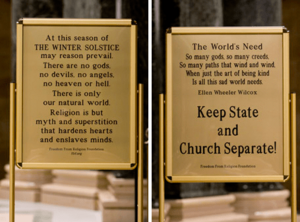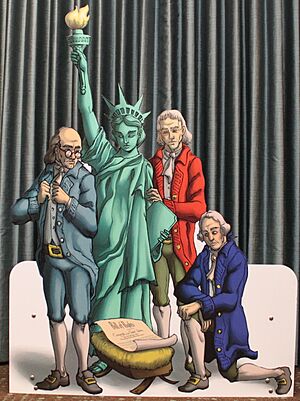Freedom From Religion Foundation facts for kids
 |
|
| Abbreviation | FFRF |
|---|---|
| Formation | 1976 |
| Founder | Anne Nicol Gaylor |
| Type | Non-profit |
| Legal status | 501(c)(3) educational organization |
| Purpose | Separation of church and state, nontheism, atheism, secularism |
| Headquarters | Madison, Wisconsin, U.S. |
|
Region served
|
United States |
|
Membership
|
36,000 members |
| Annie Laurie Gaylor | |
| Dan Barker | |
| Stephen Hirtle | |
| Affiliations | Nonbelief Relief Inc |
|
Revenue (2020)
|
$12,928,696 |
| Expenses (2020) | $6,573,302 |
| Endowment (2019) | $4,705,512 |
|
Employees (2019)
|
48 |
|
Volunteers (2019)
|
19 |
The Freedom From Religion Foundation (FFRF) is an American group that works to protect the rights of people who are atheists, agnostics, or don't follow a religion. It started in 1976. FFRF believes in keeping church and state separate. This means the government should not favor or support any religion. They also help nonreligious students and religious leaders who want to leave their faith.
Contents
How FFRF Started

The FFRF was started by Anne Nicol Gaylor and her daughter, Annie Laurie Gaylor, in 1976. It became a national organization in 1978. In 2012, FFRF had over 19,000 members. Their main office is in Madison, Wisconsin, in an old building that used to be a church home.
In 2011, FFRF teamed up with the Richard Dawkins Foundation for Reason and Science to create The Clergy Project. This is a private online group that helps religious leaders who are questioning their faith and want to leave their religious roles.
FFRF also helps the Secular Student Alliance. This group supports nonreligious students on college campuses.
In 2015, FFRF created Nonbelief Relief. This is a group that helps people in need around the world. It provides aid after natural disasters or other difficult situations.
FFRF in the Media
FFRF publishes a newspaper called Freethought Today ten times a year. Since 2006, they have also produced a radio show called Freethought Radio. This show is broadcast live and is hosted by FFRF's co-presidents, Dan Barker and Annie Laurie Gaylor. The show often talks about historical figures who were freethinkers. It also uses parts of John Lennon's song Imagine.
Annie Laurie Gaylor used to edit the Freethought Today newspaper. Her husband, Dan Barker, is a musician and writer. He used to be a Christian minister before becoming an atheist. He has written several books, including Just Pretend: A Freethought Book for Children. Both Dan and Annie Laurie are co-presidents of FFRF.
FFRF's Legal Work
FFRF often takes legal action to make sure the government follows the rule of separation of church and state. They believe that government money and public spaces should not be used to promote religion.
Government Programs
Social Services
FFRF has challenged government programs that use taxpayer money to fund religious social services. For example, in 2004, FFRF questioned if it was right for the White House to promote faith-based groups for federal funding. The Supreme Court later ruled that taxpayers couldn't challenge these specific government expenses.
FFRF also challenged a program in Indiana that hired a pastor for a state agency. In response to FFRF's lawsuit, Indiana ended the program in 2007.
Health Care
FFRF has also worked to keep religion separate from public health care. In 2003, they sued Montana because they believed the state was unfairly funding religious nursing programs. A court agreed that the state's funding of faith-based healthcare went against the First Amendment.
They also challenged the Department of Veteran Affairs for asking patients about their religion and using chaplains for medical treatment. FFRF argued this mixed religion too much with government health care.
Education
FFRF has taken action against religious practices in public schools and universities.
In 2001, FFRF sued a school district in Tennessee for holding weekly Bible classes for all elementary students. A court ruled that it was unconstitutional for the school to teach the Bible as literal truth to students.
In 2005, FFRF filed a lawsuit against the University of Minnesota. They argued that state money was helping to fund a partnership with a religious seminary. The University later agreed to end the partnership and stop teaching courses that mixed faith and health.
FFRF also sued the U.S. Department of Education in 2005. They argued that the department was giving funds to a Bible college where students mainly took religious courses. The lawsuit was settled, and the Department of Education agreed not to give a large amount of federal money to the college.
More recently, FFRF has worked to limit the official role of religious figures in public school sports. For example, in 2020, FFRF argued that a pastor should not have an official role with the Boise State football team. The university agreed to remove the pastor from official team travel and stop calling him the team chaplain. This means students can still talk to the pastor on their own, but he won't have an official role with the team.
Religion in Public Spaces
Public Property Displays
FFRF often challenges religious displays on public property. They believe these displays violate the separation of church and state.
In 2007, FFRF sued the city of Green Bay, Wisconsin, for placing a nativity scene at city hall. The city removed the scene before the case was heard, and the judge dismissed the suit, saying FFRF had already won.
In 2011, FFRF tried to place a winter solstice display in Warren, Michigan, after the city refused to remove a nativity scene. The mayor refused, and FFRF's lawsuit was dismissed.
FFRF also worked with the American Civil Liberties Union (ACLU) in 2011 to remove a display of the Ten Commandments from public schools in Giles County, Virginia. After a lawsuit, the school board agreed to remove the display.
FFRF has also placed its own signs in state capitols during the winter holiday season. These signs promote reason and the idea that there are no gods or devils, only the natural world.

In 2013, FFRF added a "natural nativity" scene to the Wisconsin State Capitol. It featured figures like Charles Darwin and Albert Einstein instead of traditional nativity figures.
In 2015, FFRF tried to put a "secular Nativity" scene in the Texas State Capitol. This scene featured the Bill of Rights and founding fathers. The governor demanded it be removed. After legal challenges, a court ruled in 2018 that FFRF's rights were violated.
FFRF also helped fund a statue of Clarence Darrow in Dayton, Tennessee, in 2017. Darrow was a lawyer who defended a teacher in the famous 1925 Scopes Monkey Trial for teaching evolution. The statue is near one of Darrow's opponent in the trial.
Prayer in Government and Schools
FFRF has challenged government-led prayers. In 2008, FFRF sued the U.S. government over the National Day of Prayer. A judge ruled it unconstitutional, saying it was a religious exercise with no government purpose. However, a higher court later dismissed the challenge, saying FFRF didn't have the right to sue in that case.
In 2013, FFRF asked the city council of Rapid City, South Dakota, to stop starting meetings with Christian prayers. The mayor said prayers would continue.
In 2022, FFRF sent a letter to Lake County, Florida, after a Christian prayer was given following a non-religious invocation at a county meeting. FFRF argued that the "corrective" Christian prayer was unfair and unconstitutional.
Tax Rules
Minister Housing Allowance
FFRF has challenged a tax rule that allows "ministers of the gospel" to claim part of their salary as a tax-free housing allowance. FFRF believes this gives special treatment to religious groups. They argue that the government should treat all groups equally, whether religious or not. A federal judge initially sided with FFRF in 2013, but a higher court later said the tax rule could stay.
Political Activities of Religious Groups
FFRF has also sued the IRS for not enforcing rules that stop tax-exempt religious groups from getting involved in politics. FFRF argued that some religious groups were openly ignoring these rules. A judge allowed the lawsuit to go forward, saying FFRF had the right to seek an order for the IRS to treat all organizations fairly. The lawsuit was later settled.
Financial Reporting
In 2012, FFRF sued the IRS because religious organizations are not required to file a yearly Form 990, which is a financial report required for most other non-profit groups. FFRF argued that all non-profits, including religious ones, should have to file these forms. The case was dismissed.
Events and Awards
FFRF has held conventions since 1977. These events feature speakers and give out awards. They also hold "NonPrayer Breakfasts" which are moments of fun instead of silence.
The Emperor Has No Clothes Award is given by FFRF to public figures who speak openly about the problems they see with religion. This award has been given since 1999 to many well-known people.
FFRF's Money
In 2013, FFRF was given a high rating by Charity Navigator, a group that evaluates charities. They reported that FFRF had a lot of income and assets. The co-presidents, Dan Barker and Annie Laurie Gaylor, received salaries that were a small part of the group's overall funds.
FFRF spends money on legal fees for cases supporting the separation of church and state. They also spend a lot on education, outreach, publishing their newspaper, and broadcasting their radio show.
See Also
- Irreligion
- Separation of church and state in the United States
- Criticism of religion
- American Atheists
 | Aaron Henry |
 | T. R. M. Howard |
 | Jesse Jackson |


